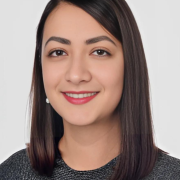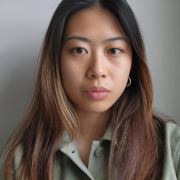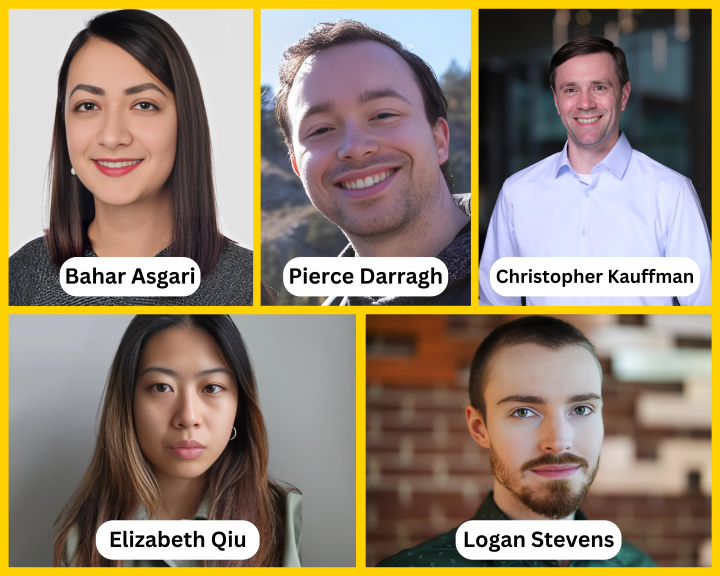Department of Computer Science Honors Top Teachers for 2023-24 Academic Year
The University of Maryland's Department of Computer Science recognized its outstanding educators for the 2023-24 academic year, awarding Bahar Asgari, Pierce Darragh, Christopher Kauffman, Elizabeth Qiu and Logan Stevens for their contributions in four distinct categories. Each year, the department honors professors, instructors, STIC facilitators and teaching assistants through a nomination and selection process designed to identify exceptional teaching and mentorship.
The recipients were chosen through student nominations, typically collected mid-spring, followed by a review and selection at the end of the school year. The annual awards are part of the department’s commitment to recognizing those who play a crucial role in shaping the educational experiences of computer science students at the university.
“Our faculty awardees demonstrate unparalleled dedication and a passion for advancing our teaching mission,” said Department Chair Matthias Zwicker, who holds the Elizabeth Iribe Chair for Innovation and the Phillip H. and Catherine C. Horvitz Professorship. “Their contributions set a powerful example for our students and colleagues alike, fostering a culture of excellence and high academic standards that shape our community.”
About the Award Recipients
Bahar Asgari, Assistant Professor
 Asgari holds a joint appointment with the University of Maryland Institute for Advanced Computer Studies (UMIACS) and is affiliated with the university’s Electrical and Computer Engineering (ECE) department. Asgari joined UMD after working at Google’s Systems and Services Infrastructure team, where she contributed to enhancing system performance and developing strategies to optimize memory usage, cost and reliability. She earned her Ph.D. in Electrical and Computer Engineering from Georgia Tech in 2021 and was recognized as a Rising Star in EECS in 2019.
Asgari holds a joint appointment with the University of Maryland Institute for Advanced Computer Studies (UMIACS) and is affiliated with the university’s Electrical and Computer Engineering (ECE) department. Asgari joined UMD after working at Google’s Systems and Services Infrastructure team, where she contributed to enhancing system performance and developing strategies to optimize memory usage, cost and reliability. She earned her Ph.D. in Electrical and Computer Engineering from Georgia Tech in 2021 and was recognized as a Rising Star in EECS in 2019.
“I am truly honored to receive this award,” Asgari said. “I always knew I’d enjoy teaching, but since joining UMD, the amazing students here have made me love it even more. Every day, I learn from their insightful questions and the lively discussions they initiate. This award also acknowledges the efforts of everyone who has contributed to shaping the courses I teach and the wonderful support of my TAs. Thank you to the UMD community for making my journey so fulfilling.”
Pierce Darragh, Graduate Teaching Assistant
 Darragh is a Ph.D. student specializing in the intersection of programming languages and computer science education. He collaborates with Associate Professor David Van Horn to improve the educational outcomes of CMSC 430, an upper-level elective course focusing on compilers and programming languages. Darragh’s research examines various approaches to enhancing student engagement and comprehension. He has expressed an interest in pursuing a tenure-track position at a large university where he can continue his educational initiatives.
Darragh is a Ph.D. student specializing in the intersection of programming languages and computer science education. He collaborates with Associate Professor David Van Horn to improve the educational outcomes of CMSC 430, an upper-level elective course focusing on compilers and programming languages. Darragh’s research examines various approaches to enhancing student engagement and comprehension. He has expressed an interest in pursuing a tenure-track position at a large university where he can continue his educational initiatives.
“Over the past few years, I’ve had the opportunity to help teach some of the most incredible students, and I’ve loved working with all of them,” Darragh said. “Although our course material is linear, each student’s learning path is unique, and I like to think that this award indicates I have successfully helped them navigate their path to the end. I am incredibly honored to receive recognition for these efforts. I accept it as a challenge to continue improving as an educator for my students now and in the future.”
Christopher Kauffman, Senior Lecturer
 Kauffman’s doctoral research focused on machine learning applications to structural biology problems, including protein structure prediction and the interactions of proteins with ligands and DNA. His academic interests range from mathematical optimization and semi-definite programming to programming languages, operating systems, and technology ethics. He is actively involved in the university’s efforts to integrate advanced computational techniques into the classroom.
Kauffman’s doctoral research focused on machine learning applications to structural biology problems, including protein structure prediction and the interactions of proteins with ligands and DNA. His academic interests range from mathematical optimization and semi-definite programming to programming languages, operating systems, and technology ethics. He is actively involved in the university’s efforts to integrate advanced computational techniques into the classroom.
“It’s been said before but is always worth repeating: no one wins these awards on their own merits alone,” Kauffman said. “The success I’ve had in the classroom is built on the backs of hard-working TAs who are the educational front line in our classes, adept colleagues who prepare students well for the courses I teach, supportive staff who guide all of us through difficulties, adept facilities managers who maintain our learning environments, and enthusiastic students who come to courses eager to learn. I am honored to be part of this community and hope to keep contributing to it in ways that merit recognition.”
Elizabeth Qiu, Undergraduate Teaching Assistant
 Qiu, a junior computer science major at UMD, was a teaching assistant for three semesters, working with over 50 teaching assistants across multiple sections and supporting class sizes ranging from 175 to 1,000 students. She became the youngest head teaching assistant in the department’s history and was responsible for overseeing logistics, hosting office hours, grading and even lecturing.
Qiu, a junior computer science major at UMD, was a teaching assistant for three semesters, working with over 50 teaching assistants across multiple sections and supporting class sizes ranging from 175 to 1,000 students. She became the youngest head teaching assistant in the department’s history and was responsible for overseeing logistics, hosting office hours, grading and even lecturing.
“Perhaps there are few moments in life as unexpected as being called in as a last-minute backup to serve as a teaching assistant for CMSC 351,” Qiu said. “Growing up in the world of classical music, I learned that teaching, like performing, is an art—an ongoing pursuit of excellence. Receiving this award is a reminder of the reciprocal nature of teaching: growth happens for everyone involved. I’m very thankful to the faculty and staff for taking a chance on me and to the students at Maryland for nominating me and allowing me to be part of their educational journey.”
Logan Stevens, STIC Student Facilitator
 Stevens is a researcher specializing in human-computer interaction (HCI), extended reality (XR) and education. He has led research projects at Brown University, the GAMMA Lab, Corning Incorporated and the David C. Driskell Center. His long-term goal is to develop technologies that enhance users’ focus, productivity and cognitive performance.
Stevens is a researcher specializing in human-computer interaction (HCI), extended reality (XR) and education. He has led research projects at Brown University, the GAMMA Lab, Corning Incorporated and the David C. Driskell Center. His long-term goal is to develop technologies that enhance users’ focus, productivity and cognitive performance.
“I am deeply honored and grateful for this award,” Stevens said. “I am especially thankful for the Student Initiated Courses (STICs) program and the Department of Computer Science for providing students with the opportunity to create and teach their courses, which is a wonderful way for students to experience the incredible breadth of the field of computer science, as well as the magnificent diversity of interests throughout the student body. I would also like to thank the faculty advisors I have worked with, Dr. Evan Golub and Dr. Roger Eastman, for their thoughtful input and steadfast support.”
With over 4,400 undergraduates and approximately 500 graduate students, UMD has one of the largest computer science programs in the nation. Outstanding teachers are critical to the department’s student-centered approach and to its top ranking among U.S. public undergraduate and graduate programs.
—Story by Samuel Malede Zewdu, CS Communications
The Department welcomes comments, suggestions and corrections. Send email to editor [-at-] cs [dot] umd [dot] edu.
